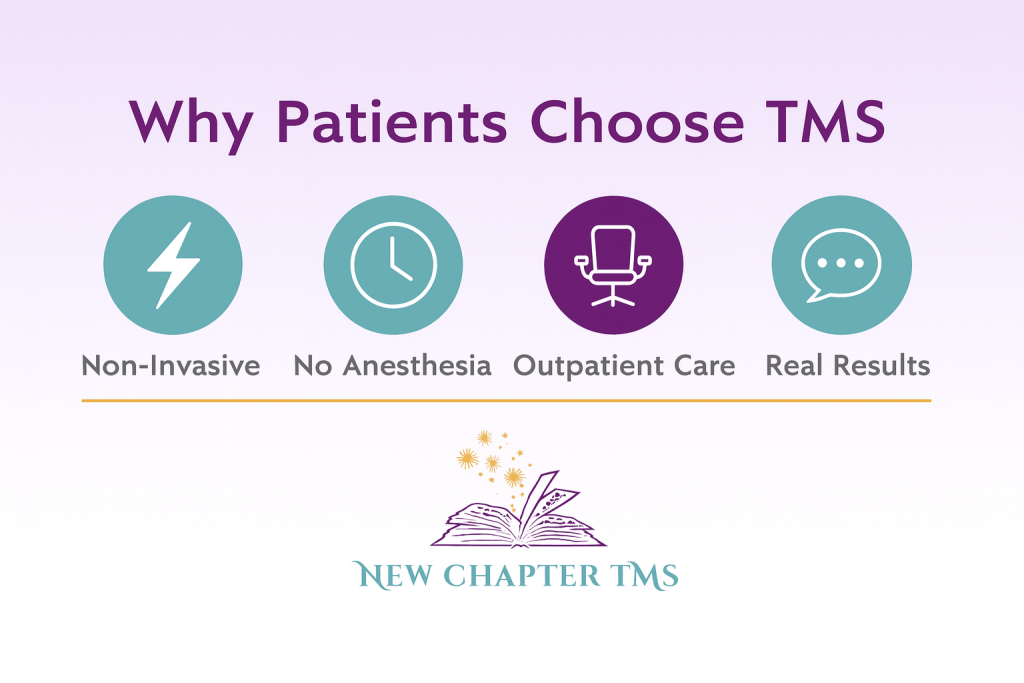When Medications Stop Working: Is It Time for TMS?
New Connections, New Hope — #YourNewChapter
If you’ve tried antidepressants and still don’t feel like yourself, you’re not alone. Many people find that the first—or even second—medication doesn’t bring the relief they hoped for. When that happens, it’s natural to wonder: what’s next?
How Do You Know When Medications Aren’t Working?
Clinicians look at a few key signs that it might be time to consider another approach:
- You’ve taken an antidepressant at a therapeutic dose for long enough (usually 6–8+ weeks) without meaningful improvement.
- You’ve tried more than one medication and still have symptoms that affect your daily life, relationships, or work.
- Side effects make it hard to stay on the medication—or you’re tired of “trial-and-error” cycling.
If these sound familiar, your provider may describe your situation as treatment-resistant depression (TRD). That phrase can sound discouraging, but it doesn’t mean your depression is untreatable—it simply means your brain may need a different kind of help.
In large studies like the STAR*D trial (Rush et al., 2006), researchers found that with each new antidepressant trial, the likelihood of full recovery decreased while side effects increased. Modern guidelines, including CANMAT 2024 and the American Psychiatric Association, now recommend Transcranial Magnetic Stimulation (TMS) as a next-line option after one or two unsuccessful medication trials—not a last resort.
Why Medications Sometimes Stop Working
Depression is complex. Even with the right medication, your brain’s communication networks may stay “stuck” in unhealthy patterns. Common reasons antidepressants stop working include:
- Brain adaptation: Over time, your brain can become less responsive to certain medications.
- Side effects or limited benefit: Finding a tolerable, effective dose can be difficult.
- Network imbalance: Depression involves disrupted brain circuits that medication alone may not fully rebalance.
- Stress, inflammation, or trauma: These biological and psychological factors can blunt medication effects.
When this happens, it’s time to look beyond the pill bottle.
What Is TMS?
Transcranial Magnetic Stimulation (TMS) is an FDA-approved, non-invasive treatment for depression that uses gentle magnetic pulses to stimulate specific brain areas involved in mood regulation.
Each session takes place in a comfortable outpatient setting—no anesthesia, no recovery time, and no systemic side effects. You can read, listen to music, or chat during treatment, and drive yourself home afterward.
Quick facts:
- Non-invasive — no surgery, no anesthesia.
- Outpatient — short daily sessions over several weeks.
- Well tolerated — mild scalp discomfort or headache may occur early on but typically fade.
- Safe and effective — backed by decades of research and real-world data; the TMS coil was first invented in 1985!

Why Consider TMS Instead of Another Medication Trial?
After one or two antidepressant attempts, the odds of success with yet another medication drop significantly. TMS takes a different approach—it activates and strengthens the brain’s mood network directly, helping the brain reconnect where medications haven’t been enough.
In recent studies and real-world data, many people who hadn’t improved with medications experienced substantial gains in mood, energy, and daily functioning after TMS.
What to Expect: The TMS Process
- Consultation: You’ll meet with Dr Kiira to review your history, symptoms, and treatment goals.
- Mapping: The provider identifies your individualized location and strength of your TMS treatment.
- Daily Sessions: Short weekday sessions build benefit over time, typically over 6-8 weeks.
- Progress Tracking: We monitor changes in energy, mood, and motivation throughout treatment.
- Aftercare: Some people benefit from maintenance sessions or continued therapy—your plan is personalized.
Many patients describe feeling clearer, lighter, and more engaged with life as treatment progresses.
Common Questions
Will it change my personality?
No. TMS is not electroconvulsive therapy (ECT) and doesn’t cause memory loss. Most patients say they feel more like themselves again.
Is it covered by insurance?
Yes. Most major insurers cover TMS for depression once certain criteria are met—such as trying medications and therapy first.
Can teens get TMS?
Yes. Neurostar TMS is FDA-cleared for adolescents ages 15–21 with depression. It’s a safe, non-medication option that families can discuss with their provider.
How to Decide If It’s Time to Talk About TMS
Ask yourself:
- Have I tried one or more antidepressants long enough without the improvement I need?
- Am I looking for a non-medication option with a strong safety record?
- Would I prefer a structured, time-limited course that focuses on lasting change?
If you answered yes, it may be time to consider TMS. It’s not a sign of failure—it’s the next evidence-based step in modern depression care.

The Bottom Line
When medications aren’t enough, TMS offers another way forward.
It’s safe, non-invasive, and designed to help your brain reconnect and heal. Many people who once felt “stuck” find that TMS helps them rediscover hope, motivation, and connection.
💬 Questions? Schedule a TMS consult.
📞 In crisis? Call or text 988 anytime.
References:
- Rush AJ, et al. Am J Psychiatry. 2006;163(11):1905–1917.
- Canadian Network for Mood and Anxiety Treatments (CANMAT) Guidelines, 2024 Update.
- Dalhuisen M, et al. Brain Stimulation. 2024.
